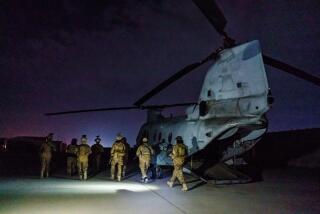Blowback Time
- Share via
Wars have unintended consequences. Certainly U.S. intelligence services, which stepped into a war in Afghanistan in the 1980s with the intention of giving Soviet invasion forces a bloody nose, did not anticipate the terror that would come home to roost a decade later.
In CIA jargon the phenomenon is known as “blowback.” By arming Afghan resistance fighters to the tune of half a billion dollars a year, Washington’s operatives indeed gave the Soviet army a problem in Afghanistan. But now it’s blowback time, and legions of Muslim volunteers from the Middle East who learned their trade in that faraway land have returned to their own countries as spearheads of violent militancy.
In a sweeping, just-concluded series that investigated what was labeled a “deadly fallout of Holy War,” a team of Times reporters toted up the costs and weighed the prospects of further damage from this classic, and instructive, example of the unintended consequences of intervention in a distant war.
Algeria, Bosnia-Herzegovina, France, the Philippines and other countries have all been touched by the flame of militancy lighted in Afghanistan with the aid of U.S. and Saudi cash. In a time when terrorism has come fully into American consciousness, the costs of the Afghan intervention are clear. No country can take a hand in another’s fight without risk.
Not all the violence of the Muslim world has been spawned in Afghanistan, but each militant who served there is a potential “force multiplier,” one American official told Times reporters. “They can’t change the outcome, but they can certainly drive up the pain.”
Consider Ramzi Ahmed Yousef, Kuwaiti-born and by some accounts trained by Afghan guerrillas in the mid-1980s. Yousef is now in New York, on trial on charges of plotting to bomb American airliners. He is also alleged to be the mastermind of the bombing of the World Trade Center in 1993. Blowback. A flame ignited: Many who learned violence in Afghanistan are now practicing that craft elsewhere.
More to Read
Sign up for Essential California
The most important California stories and recommendations in your inbox every morning.
You may occasionally receive promotional content from the Los Angeles Times.













